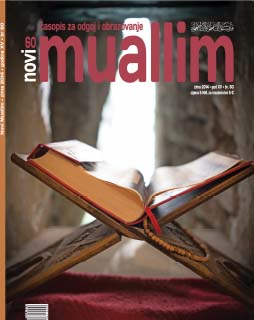Kontinuitet izučavanja arapskog jezika obavezuje nas na nove iskorake
CONTINUITY OF ARABIC LANGUAGE STUDIES OBLIGES US TO PROGRESSS
Author(s): Zehra AlispahićSubject(s): Social Sciences, Language studies, Language and Literature Studies, Education, Foreign languages learning, Theoretical Linguistics, Theology and Religion, Islam studies, School education
Published by: Rijaset Islamske zajednice u Bosni i Hercegovini
Keywords: study of the Arabic language; educational system; maktab; madrassa; textbooks; department; cathedra
Summary/Abstract: Association of Bosnia and Herzegovina with oriental culture and languages date back to time of the official establishment of Islam in the Balkan Peninsula in second half of the 15th century. Thus, we may say that the Arabic language represents an inseparable segment of historical, cultural and civilizational identity of Bosniaks and the other nations in this territory. Arabic language is continuously present in the educational system of Bosnia and Herzegovina since the end of the 15th century, at first in religious educational and upbringing institutions (maktab, madrassa) and, by the end of 19th century Arabic language, as a language of the world culture and civilization was introduced in the programmes of secular high schools. At the institutions of higher and high academic level Arabic language is present since 19th century, primarily at the School for the Sharia Judges and later in the Higher Islamic Sharia and Theology School, and with the establishment of Sarajevo University and its Faculty of Philosophy with the Department for Orientalism (Department for Oriental Philology) in year 1950, Arabic language is studied at other higher academic institutions. Continuity of the Arabic language studies in Bosnia and Herzegovina is a matter of pride, however the new era requires further progress and answers to many issues, some of these we brought up in this Forum about the Arabic language: what are the real aims of teaching the Arabic language at all the levels of the educational process, especially in madrassas and universities? Why is it that teaching of the Arabic language, regardless of the level, does not produce satisfying results in context of mastering the skills of understanding and communication when compared with other foreign languages? Are madrassas, as the faithful guardians of the Arabic language through so many centuries behind us, bearing in mind the fact that they educate the largest number of students studying Arabic language as compulsory subject, willing to make progress in the methodology of teaching Arabic language, undertake revision of the teaching plan and programme and introduce new modern and attractive textbooks that would respond to the requirements of the present time and to the needs of new generations, though at the same time ensuring and preserving the missionary role of Arabic language.
Journal: Novi Muallim
- Issue Year: 2014
- Issue No: 60
- Page Range: 13-18
- Page Count: 6
- Language: Bosnian

